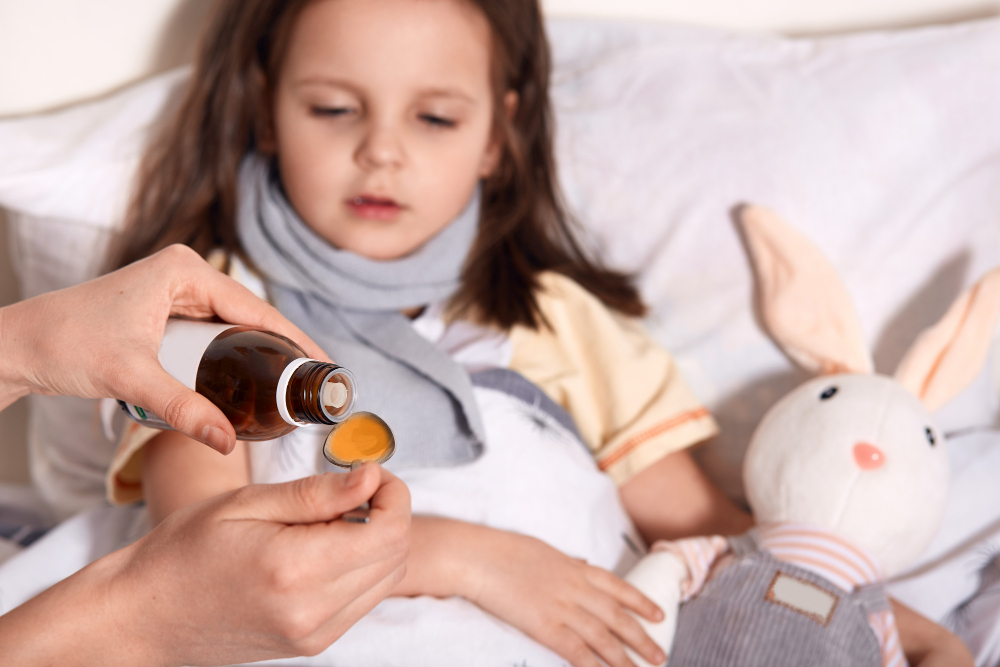The flu, or influenza, is a contagious respiratory illness that can affect people of all ages. While healthy adults often recover with rest and fluids, children—especially those under 5—can be more vulnerable to complications. For parents, knowing how to choose and use flu treatment medications safely is essential for protecting a child’s health and speeding recovery.
This guide explains the different treatment options, safety considerations, and best practices for managing flu symptoms in children.
Understanding the Flu in Children
Flu in children is caused by influenza viruses, which spread through respiratory droplets when an infected person coughs, sneezes, or talks. Common symptoms include:
- High fever
- Cough and sore throat
- Runny or stuffy nose
- Muscle aches
- Fatigue
- Chills
In severe cases, it can lead to complications like pneumonia, dehydration, or worsening of existing medical conditions such as asthma.
Types of Flu Treatment Medications for Children
Flu treatment medications generally fall into two categories:
1. Antiviral Medications
Antivirals are prescription medicines that can reduce the severity and duration of the flu if taken early (within 48 hours of symptom onset). Common pediatric antivirals include:
- Oseltamivir (Tamiflu®) – Approved for children as young as 2 weeks.
- Zanamivir (Relenza®) – Approved for children 7 years and older (inhalation form).
Key points:
- These medications do not cure the flu but help prevent complications.
- They are most effective when started quickly after symptoms begin.
- Always follow a doctor’s prescription and dosing instructions.
2. Over-the-Counter (OTC) Symptom Relief
OTC medications can help manage symptoms, but they do not treat the flu virus itself.
- Fever and pain relievers: Acetaminophen (Tylenol®) or ibuprofen (Advil®, Motrin®) can help lower fever and relieve aches. Avoid aspirin in children due to the risk of Reye’s syndrome.
- Cough and cold medicines: Most are not recommended for children under 6 because of potential side effects and limited effectiveness.
- Saline nasal drops or sprays: Safe for all ages to relieve nasal congestion.
Safety Guidelines for Using Flu Medications in Children
1. Consult a Pediatrician First
Always seek medical advice before starting any medication—especially in children under 5, or if your child has chronic health conditions.
2. Follow Age and Weight Guidelines
Children’s medication dosages are often based on weight, not just age. Using too much or too little can be harmful or ineffective.
3. Avoid Aspirin
Aspirin can cause Reye’s syndrome, a rare but serious condition in children and teenagers recovering from viral illnesses.
4. Read Labels Carefully
Many multi-symptom cold and flu products contain overlapping ingredients (e.g., acetaminophen). Double-dosing can lead to accidental overdose.
5. Be Cautious with OTC Cough Medicines
For children under 6, these medicines may cause more harm than good. Instead, try honey (for children over 1 year old) to soothe the throat.
6. Complete the Full Course of Antivirals
If prescribed antiviral medication, ensure your child takes the entire course—even if symptoms improve early—to prevent relapse or complications.
When to Seek Emergency Medical Care
Parents should seek urgent medical attention if a child has:
- Trouble breathing or rapid breathing
- Persistent high fever (above 103°F / 39.4°C)
- Severe lethargy or unresponsiveness
- Dehydration (few wet diapers, dry mouth, no tears when crying)
- Blue or gray skin tone
- Symptoms that improve and then worsen again
Supporting Recovery at Home
Flu recovery isn’t just about medication—comfort care plays a vital role:
- Rest: Encourage your child to sleep and avoid strenuous activity.
- Hydration: Offer water, clear soups, and electrolyte solutions to prevent dehydration.
- Nutrition: Soft, easy-to-digest foods can help keep energy up.
- Humidified Air: Using a cool-mist humidifier can ease coughing and congestion.
Preventing the Flu in Children
The best flu treatment is prevention. Parents should:
- Get annual flu vaccinations for children 6 months and older.
- Teach proper handwashing and cough etiquette.
- Keep sick children home from school or daycare to prevent spread.
- Clean and disinfect frequently touched surfaces.
Final Thoughts
Flu treatment medications for children can be safe and effective when used correctly. The key is early medical consultation, careful attention to dosing, and a combination of symptom relief with supportive care. Parents should never self-prescribe antivirals or give adult-strength medicines to children.
When used appropriately, flu treatment medications—paired with rest, fluids, and parental care—can help your child recover faster and avoid serious complications.





Comments